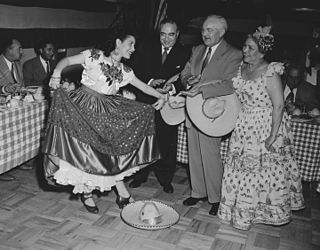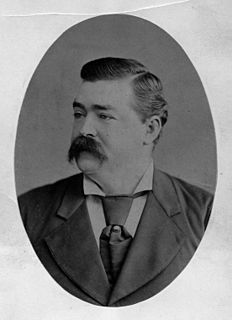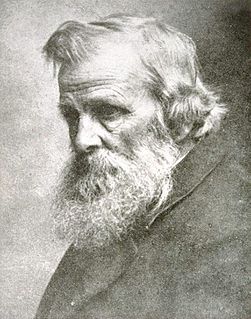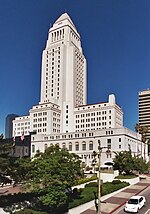John Clinton Porter was a U.S. political figure. The Los Angeles Times wrote that he represented a "unique mixture of reform politics and xenophobic Protestant populism [that] took him quite literally from the junk yard to City Hall.

Frank L. Shaw was the first mayor of a major American city to be recalled from office, in 1938. He was also a member of the Los Angeles City Council and then the Los Angeles County Board of Supervisors. His administration was seen as one of the most corrupt in Los Angeles history, although he had some defenders and was never charged officially with any crime.

Fletcher Bowron was an American lawyer, judge, and politician. He was the 35th mayor of Los Angeles, California, from September 26, 1938, until June 30, 1953. He was the longest-serving mayor to date in the city, and was the city's second longest-serving mayor after Tom Bradley, presiding over the war boom and very heavy population growth, and building freeways to handle them.
Alpheus P. Hodges was the first Mayor of Los Angeles, California after the city was incorporated on April 4, 1850. However, he was preceded by Stephen C. Foster, who was the first mayor under American rule.

Antonio Francisco Coronel was a Californio of Mexican Alta California, that transitioned into various political offices after U.S. statehood of California in 1850. He served as the fourth mayor of Los Angeles from 1853 to 1854.
James Edgar Davis was an American police officer who served as the chief of the Los Angeles Police Department (LAPD) from 1926 to 1929, and from 1933 to 1939. During his first term as LAPD chief, Davis emphasized firearms training. Under Davis, the LAPD developed its lasting reputation as an organization that relied on brute force to enforce public order. It also became very publicly entangled in corruption. Members of the LAPD were revealed to have undertaken a campaign of brutal harassment, including the bombings of political reformers who had incurred the wrath of the department and the civic administration.

James Robert Toberman served six one year terms as Mayor of Los Angeles. He first served between 1872 and 1874 and again from 1878 to 1882. Mayor James R Toberman switched on the city's first electric streetlights. He helped map out the first street car grid and water and sewer systems. Toberman came to Los Angeles in 1864 when president Abraham Lincoln appointed him U.S. Revenue Assessor.

Owen McAleer was a Los Angeles, California, businessman who was mayor of the city between 1904 and 1906.
Jose Cristobal Aguilar was a pioneer of 19th-century Los Angeles, California, politics in the early days of American rule. He was the last Hispanic mayor of the city until 2005.

Frank Rader served as the 22nd Mayor of Los Angeles from 1894 until 1896.

Thomas E. Rowan
(1842–1901) served as the 21st Mayor of Los Angeles from 1892 until 1894.

Manuel Requena (1802–1876) was president of the Los Angeles Common Council in the early 1850s. He served the city in both the Mexican and American periods.

Stephen Clark Foster was a politician, the first American mayor of Los Angeles under United States military rule. Foster served in the state constitutional convention, and was elected to the State Senate. He was elected as mayor of Los Angeles in 1856, and later elected for four terms to the Los Angeles County Board of Supervisors.

Roy Edmund Steckel served as Los Angeles Police Department Chief of Police from December 30, 1929 to August 9, 1933. He succeeded and was succeeded as chief by James E. "Two-Guns" Davis. During Steckel's reign as Chief of Police, Los Angeles hosted the 1932 Summer Olympic Games. The L.A.P.D. employed 800 duly sworn police officers. According to the L.A.P.D.'s official site, crime was very low during the Olympics, with there being only "two robberies, eight burglaries, 39 thefts, and 10 auto thefts."

John Quincy Adams Tufts was an American Republican politician from Iowa and California. He was founder of a sporting goods company in Los Angeles, California.
Wallace Woodworth was a wealthy businessman and rancher in Los Angeles County, California, in the 19th century. He was a member of the governing bodies of both Los Angeles City and County. He helped organize the city's first gas company.

Edward Fallis Spence, known as E. F. Spence, was a banker, entrepreneur and property developer who was a member of the California legislature, a Nevada County official and the mayor of Los Angeles, California, in 1884–86.
The 1933 election for Mayor of Los Angeles took place on May 2, 1933, with a run-off election on June 6, 1933. Incumbent John Clinton Porter was defeated by Frank L. Shaw.
The 1937 election for Mayor of Los Angeles took place on April 6, 1937, with a run-off election on May 4, 1937. Incumbent Frank L. Shaw was re-elected.
















